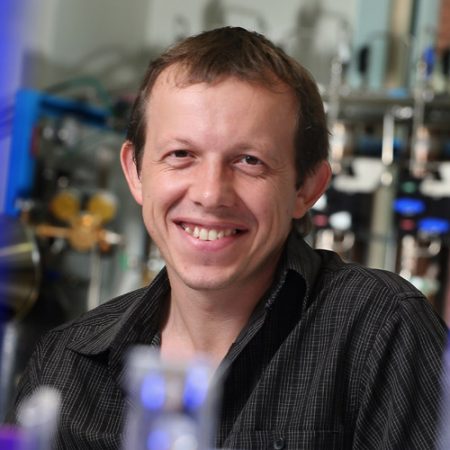
Michael Shatruk, an assistant professor in Florida State University’s Department of Chemistry and Biochemistry who is working to develop new magnetic materials, has been awarded the prestigious ExxonMobil Solid State Chemistry Faculty Fellowship for 2012 by the American Chemical Society’s Division of Inorganic Chemistry.
Each year since 1979, the American Chemical Society has awarded the fellowship to a young scientist who has made substantial contributions to the discipline of solid-state chemistry and has the potential to emerge as a leader in the field.
“It is wonderful to see a younger faculty member like Dr. Shatruk receiving national recognition for his research,” said Kirby Kemper, vice president for Research at Florida State. “He is a credit to Florida State University and is our first faculty member to receive this distinction.”
In his research, Shatruk manipulates the atomic and electronic structures of materials to induce a desired magnetic behavior. His work could one day aid in the development of a new generation of energy-efficient devices, such as electric vehicles and magnetic refrigerators.
“In part, this award was given to Dr. Shatruk based on these research implications, but primarily for the deep chemical and physical insights that he brings to the field of magnetic materials development,” said Timothy Logan, chairman of Florida State’s Department of Chemistry and Biochemistry. “This award places him in the same class as some of the leading scientists in this field nationwide. We are extremely proud of his accomplishments and look forward to many more exciting developments from this research.”
The award also will raise the profile of Florida State’s entire solid-state chemistry group, Logan said.
Shatruk will receive the fellowship, which includes a $10,000 stipend, during the American Chemical Society’s fall 2012 national meeting in Philadelphia.
“I am very honored to receive the ExxonMobil Award from the ACS Division of Inorganic Chemistry and to join the ranks of previous winners, many of whom were my inspiration to become a chemistry professor,” Shatruk said. “It is one of the most highly coveted distinctions for a junior faculty member working on solid-state chemistry, and I’ve dreamt of this fellowship ever since I began my independent research here at Florida State. It is very rewarding to realize that my peers recognized the importance of our work and the value of contributions made by my research group to the field of solid-state chemistry.”
Shatruk joined the faculty of Florida State after two post-doctoral fellowships, one at Texas A&M University from 2003 to 2007, and the other at Cornell University from 2001 to 2003. Shatruk earned a doctorate from Lomonosov Moscow State University, Russia, in 2000.




